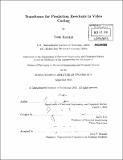Transforms for prediction residuals in video coding
Author(s)
Kamışlı, Fatih
DownloadFull printable version (19.42Mb)
Other Contributors
Massachusetts Institute of Technology. Dept. of Electrical Engineering and Computer Science.
Advisor
Jae S. Lim.
Terms of use
Metadata
Show full item recordAbstract
Typically the same transform, the 2-D Discrete Cosine Transform (DCT), is used to compress both image intensities in image coding and prediction residuals in video coding. Major prediction residuals include the motion compensated prediction residual, the resolution enhancement residual in scalable video coding, and the intra prediction residual in intra-frame coding. The 2-D DCT is efficient at decorrelating images, but the spatial characteristics of prediction residuals can be significantly different from the spatial characteristics of images, and developing transforms that are adapted to the characteristics of prediction residuals can improve their compression efficiency. In this thesis, we explore the differences between the characteristics of images and prediction residuals by analyzing their local anisotropic characteristics and develop transforms adapted to the local anisotropic characteristics of some types of prediction residuals. The analysis shows that local regions in images have 2-D anisotropic characteristics and many regions in several types of prediction residuals have 1-D anisotropic characteristics. Based on this insight, we develop 1-D transforms for these residuals. We perform experiments to evaluate the potential gains achievable from using these transforms within the H.264 codec, and the experimental results indicate that these transforms can increase the compression efficiency of these residuals.
Description
Thesis (Ph. D.)--Massachusetts Institute of Technology, Dept. of Electrical Engineering and Computer Science, 2010. Cataloged from PDF version of thesis. Includes bibliographical references (p. 135-140).
Date issued
2010Department
Massachusetts Institute of Technology. Department of Electrical Engineering and Computer SciencePublisher
Massachusetts Institute of Technology
Keywords
Electrical Engineering and Computer Science.